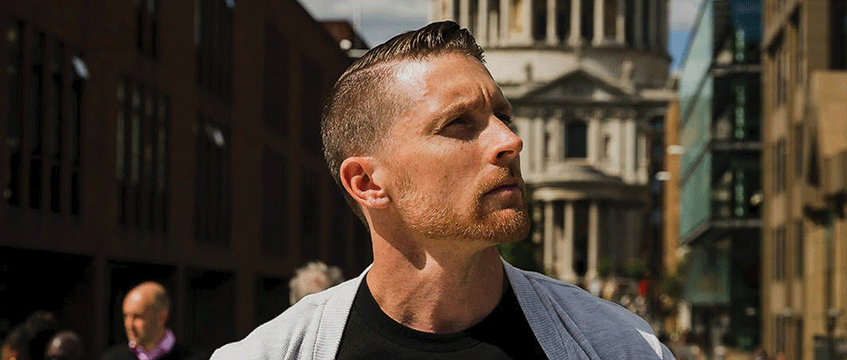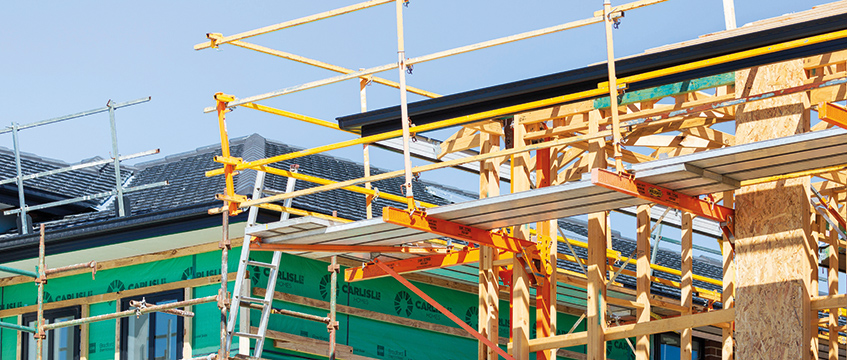“I believe that the entrepreneurs, the innovators, are who make the world a better place. If you look back at history and all the modern conveniences, we have today – everything we have – we owe it all to some entrepreneur somewhere who was bold enough to stand up and say ‘You know what? Things can be done better, let’s challenge the status quo.’“
That is the opening gambit from Bold founder Caleb Parker when we sit down to talk about the planned expansion of the company following its acquisition by Newflex in late 2019. Parker is all about the entrepreneur (he is one himself, after all). He’s all about championing them, supporting them and providing them the platform – or to use his lingo, the full stack – to achieve. And, ultimately, to change the world for the better.
And it would be easy to argue that Parker is trying to do the same for the world of real estate. He certainly has some bold ambitions when it comes to the future of how and where we work.
Parker began his career in real estate working for Regus in the US, before moving to the UK in 2013 to set up meetingrooms.com, a business that sought to provide a solution for those entrepreneurs who Parker champions by providing a marketplace for booking meeting space. It was a good idea. A lot of start-ups didn’t need a permanent office but would need a decent meeting room from time to time. A place to bring clients and hold collaborative meetings that wasn’t the local Costa or Pret.
The Newflex approach
Newflex operates much like a hotel company, offering different brands across its space as a service offering for different locations and different customer bases – easyHub for the more budget-conscious customer, Bold for the tech and media-savvy entrepreneurs and Serendipity Labs for those after a more exclusive offer. Deals are all secured on management contracts rather than leases, an approach the firm says ensures it is invested in making money for its property owners. The group’s portfolio currently stands at 47 locations comprising just over 1m sq ft of space.
There was one problem for Parker, however. The lack of control over the space that was on that marketplace. All Parker was doing was providing a service for entrepreneurs to find a meeting room; he wasn’t creating a community and that was what he was really after.
In 2017, with partner Magnus Olby, Parker launched Bold, a business that would still provide meeting spaces for entrepreneurs, but it would control the experience. The pair set about approaching landlords to see if they could take over underutilised meeting room space to provide on-demand facilities for entrepreneurs and innovators.
A handful of deals were within touching distance but the real estate community wasn’t quite biting yet. “We were a start-up with no covenant,” says Parker, “and we weren’t putting skin in the game.”
Bold needed to be bolder and raise some cash.
On its journey to raise capital, Bold came across Newflex and its parent company Newable. Newflex was already active in the world of serviced offices and flex space, while its parent was focused on supporting SMEs through a three-pronged approach investing in businesses that provide space (Newflex), money and advice.
“We thought that the Newable parent company, with the way they support entrepreneurs across the UK already, there was so much alignment with how we wanted to roll Bold out,” says Parker. “And Newflex had been doing management agreements across the UK for more than 20 years.”
He describes the deal to sell as a “no-brainer”, an earlier-than-intended sale but one that made sense for the growth of Bold.
The deal was agreed in late 2019 and work on developing a pipeline began in earnest. Then Covid struck.
But for a business such as Bold – and Newflex’s other brands, which include easyHub, Citibase and Serendipity Labs – Covid has underlined the value of their offers.
Even before the global work-from-home experiment, entrepreneurs, start-ups and SMEs were flex office users. They didn’t really want the space, need it or potentially couldn’t even afford it. But they did need places to get together, to collaborate, to entertain and connect with clients, colleagues and business prospects. And that is where flex has come into its own.
Service for all
The debate about the future of the office has raged since the onset of Covid and the mass swing in the number of people working from home. That debate should largely be over now. There is no death of the office, just a death of the office as you once knew it. The world is transforming into something more fluid, and real estate has to keep up.
“Today nobody needs an office. Nobody even wants an office,” says Parker. “What we do want is to be productive in our daily life. And what is it that is going to make people productive? Well, sometimes it’s an office-type environment, sometimes we can go to a café and sometimes we can work from home.”
Bold wants to service all of those needs. It wants to provide the space – the office-type environment, the quiet table or booth in which to have a conversation or the café or events space for you to interact and entertain. It even wants to provide the content, through events and podcasts to enable its members to be productive in whatever way is best for them. And real estate is now slowly starting to catch on.
“I always say we have hardware and software to our business,” says Parker. “The hardware is the layout, how it’s designed, how many meeting rooms we have, how many seats in the members lounge, how many offices. The software is the ecosystem and the community.”
The “full stack”
Last November, Bold secured its first site, signing a management agreement for almost 14,000 sq ft at Orchard Street Investment Management’s Bauhaus building in Manchester’s Spinningfields. The Bold space will run across the ground, first and second floors, providing workspace, a café and meeting space for members as well as access to capital, advice and mentoring.
Parker says the deal was a “key step” in Bold’s journey and was an example of how the business can “complement leasing strategies and help squeeze new value out of real estate assets aligned to the new working world”.
Parker says the firm wants more than 25 locations across the UK and Northern Europe within the next three years but is keen to focus on quality over quantity.
“We’ve got to get the right space for the people we serve,” he says. “I don’t have this crazy Adam Neumann growth mindset. Not necessarily today, anyway. Long term yes, but for the next couple of years we have some very structured intentional growth.”
Eventually, however, Parker is ambitious enough to want to test the theory that fortune really does favour the bold.
The ultimate ambition is a whole Bold building, not just a Bold space in every major CBD around the world. He wants the “full stack”, the whole community for entrepreneurs to thrive – beds, workspace, meeting rooms, networking, mentoring – all the content innovators need to “make the world a better place”.

To send feedback, e-mail samantha.mcclary@eg.co.uk or tweet @samanthamcclary or @EGPropertyNews











